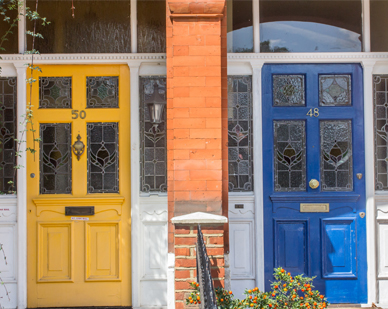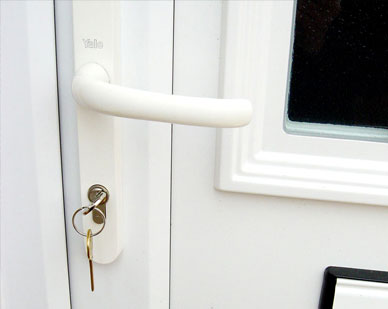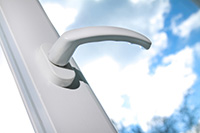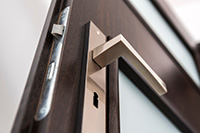
Wooden Doors

Key Stuck In uPVC Door Lock
"Help! I Can't Lock My Door!"
Door not locking? If you're having problems trying to lock your door, your key is stuck or your key is hard to turn in the lock, we have the expertise to help. There are a number of issues that you might have with locking your door. Here are some common ones and their likely causes below :
Wooden Doors
Dead Locks/Sash Lock
- Warping - Sometimes due to very poor weather conditions the door/frame can warp. This can stop the locking points engaging the keeps, therefore preventing the door from locking! This is usually a quick and simple problem to fix.
- Broken Key - Keys generally break in locks because of too much force having been applied to them. All of our engineers have specialist equipment to cut various types of keys on site
- Key Stuck In Lock - If your key is stuck in the lock then it's best to call us as soon as you can. If you use too much force trying to remove the key yourself, it's possible that your key may snap or break inside the lock cylinder. We do not recommend forcing the key out of your lock as it can snap the key, but if you must : ensure you pull it directly out rather than twisting it. Twisting it could cause it to break.
- Key Is Hard To Turn Or Won't Go In The Lock - Don’t force the key! Forcing it could break the key in the lock. It's possible that there is an issue with the Lock Cylinder. Debris or Ice from cold weather may be causing problems with the cylinder or you might simply be using the wrong key!
- Faulty Lock - The internal mechanism could be broken or worn. Our engineers carry the necessary replacement parts to repair most locks.
All locks can be fitted or upgraded to British Standard to meet insurance specifications.
- Cylinder Nightlatch
- Warping - If the door cannot physically lock due to the frame or door being warped, an adjustment of the strike plate could rectify the problem without the need of a new lock.
- Key Will Not Work - If you've had a new/spare key cut recently, it could be a poorly cut key causing the problem.
Have you Had a new cylinder fitted? The spindle may have been cut too short.
Has your nightlatch got a deadlocking function? If yes, you may have to turn the key more than once to unlock your door.
If the key does not turn at all, you may be using a wrong key or the interior snib could have accidentally engaged. If the snib has been engaged from inside, it will stop the key from working. Our engineers have specialist tools to deal with this scenario.*Sometimes burglars will “snib” the locks in homes they enter so the owner cannot just walk back into on property on their return. This will, however, alert the burglar, allowing them to make a clean getaway”*
-The cylinder could be faulty or just worn due to age -The key itself could be old, worn or cracked. *Never force a key as it may snap inside the lock. If you have both pieces of a broken key, then our locksmiths will be able to replicate a fully working duplicate, saving the cost of a new cylinder. This can be done on site!* -Our locksmiths are able to extract broken keys to avoid replacing the lock.
Composite/UPVC Doors
Problems With UPVC Doors

UPVC door with problem
- Dropped Door - It is very common for UPVC doors to drop, therefore misaligning the locking points with the keeps. It will usually make the door difficult to open, if it can at all! Modern UPVC doors are designed to be fully adjustable so this is usually quick to fix.
Tip - If the door locks perfectly while in the open position, it is an adjustment issue. However, if it is still hard to lock while in the open position it will more than likely be a mechanical fault, probably needing replacement parts.
- Faulty Euro Cylinder - If the key cylinder has failed then our locksmiths can easily replace this part, providing new keys without the need to replace the full mechanism. This will help keep the cost to a minimum.
- Faulty Mechanism - UPVC door locking mechanism problems are very common. If the full length mechanism is faulty, in certain circumstances it is possible to only replace the “Gearbox” (centre lockcase). This keeps the job cost to a minimum. Replacing full mechanisms can be expensive, but in certain scenarios it is unavoidable.
Problems With Composite Doors

Composite door with problem
- Warped Door - It is a rare occurrence, but composite doors can sometimes warp. This can make the door difficult to close and can let in draughts. If this has happened to your door, and it's still under guarantee, talk to the original door supplier about their returns and replacement policy. Many composite doors on the market come with a 10 year guarantee.
Tip - If you engage the multipoint locking system ('hooks') everytime you close the door, it can help to keep the door straight and prevent warping.
- Faulty Euro Cylinder - The door furniture and hardware on a composite door is practically identical to a UPVC door, so if the key cylinder has failed then our locksmiths can easily replace this part, providing new keys without the need to replace the full mechanism.
- Faulty Mechanism - Mechanisms on composite doors are practically identical to their UPVC counterparts. If the full length mechanism is faulty, in certain circumstances it is possible to only replace the “Gearbox” (centre lockcase). This keeps the job cost to a minimum. Replacing full mechanisms can be expensive, but in certain scenarios it is unavoidable.
Changes in weather and temperature causing uPVC door problems

Houses with door lock problems due to weather
The hot and cold weather can cause issues with your doors. Each year when the weather gets warmer or the weather gets much colder, we attend more and more call out's for door related issues, such as doors not locking or unlocking, doors sticking, doors stiff to open or close, key unable to turn or difficult to remove from lock.
uPVC doors can expand in the heat, this is why we tend to have more issues with uPVC doors in the summer. Typical problems caused by the expansion and swelling are doors becoming stiff and becoming difficult to open or close.
- uPVC door shrinkage and expansion - The change in temperatures, hot weather and warm air can cause your uPVC doors to shrink, contract and expand. This uPVC door shrinkage and expansion can make it difficult for you to lock your doors. You may feel that you have to apply force when opening and closing your doors.
Sometimes, all you'll need to do to solve this is to wait it out until the hot weather has passed. The cooler air should eventually bring your door back to it's natural state without damage. But there will be times when door issues like this cause a potential risk to your security if you can't lock your door, can't open your door or can't close your door - this is when we recommend calling a locksmith who can use their expertise and experience to make your home secure.Tip - Applying cold water to your uPVC doors during the warmer weather can help your door to regain its shape. You can achieve similar results in the colder months by using warm water.
How Storms Can Affect Locks and Doors

Heavy rain fall during a storm
Storms can bring strong winds, heavy rainfall, and changing temperatures. These can cause problems for your doors and locks. While weather conditions such as the heat or cold are more common culprits for lock issues, storms can worsen existing issues or introduce new ones. Often these require prompt attention to ensure the security of your home or business.
uPVC doors can expand in the heat, this is why we tend to have more issues with uPVC doors in the summer. Typical problems caused by the expansion and swelling are doors becoming stiff and becoming difficult to open or close.
- Swollen and Warped Doors - During a storm, wooden doors are susceptible to absorbing moisture from the heavy rain. This can cause a wooden door to swell or warp, which making it difficult for locking points to engage properly. Swollen wooden doors can also put strain on the lock cylinder and sometimes the mechanism too, leading to problems if not addressed.
- Rust and Corrosion - Storms can bring excess moisture, which can increase the risk of possible rust or corrosion on door locks, especially on external doors or gates. Rust can cause issues with the lock mechanism, making it difficult to insert or turn the key. In the worst case, rust or corrosion can cause the lock to seize up the completely.
- Jammed Locks from Debris - Strong winds during a storm can blow dirt, sand, or debris into locks. This can cause obstructions to the locking mechanism, making it difficult to operate easily. For locks exposed to such conditions, preventative maintenance is key.
Tip - If your lock appears to be jammed after a storm, avoid forcing your key in the lock, as this could break the key or the lock. Instead, contact a locksmith for assistance.
- Door Frame Misalignment - Strong winds can cause door frames to move or shift, particularly if the door is not securely fitted. The misalignment caused can make it difficult for the lock mechanism to work correctly, preventing the door from locking.
- Freezing Locks in Winter Storms - Winter storms can cause temperatures to drop to freezing rapidly, leading to freezing rain or frost that can impact your locks. If moisture gets into a lock cylinder and freezes, the key could become hard to insert or turn.
Tip - Tip: If your door or frame becomes misaligned during a storm, call a professional to assess and adjust the strike plate or hinges to ensure proper alignment.
- General Safety Concerns After Storms - After a storm, debris and structural damage can pose additional safety concerns. Doors that no longer close or lock securely will leave your home vulnerable to security risks. Addressing these issues as soon as possible will help to protect your property.
Tip - Inspect all of your doors and locks after a storm. Check for signs of damage or misalignment. If you do happen to notice any issues, contact a locksmith to make sure your locks are functioning properly and your home is secure.
Do you have any of these problems and need work done? Call us on 0800 0612 677 for a free, no obligation quote.
Weather related lock problems and jobs attended by LockRite Locksmiths
Locksmiths Near You
All LockRite locksmiths live within the locality they serve or close enough for a short commute.
Trained Locksmiths
All LockRite locksmiths are trained by experts and continue their training throughout their career.
No Unnecessary Fee's
We won't charge you a call out fee.
Work Guaranteed
Our work is guaranteed with a 12 month manufacturers warranty on parts and 90 days guarantee on all workmanship.
Find a Locksmith Near You Now
Choose from this list of the most popular cities to find a LockRite locksmith near you.
Having problems locking your door?
Our professionally trained locksmiths can unlock your door without causing unnecessary damage.
Call us now on
0800 0612 677